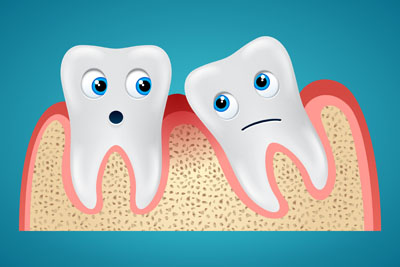 Wisdom teeth extractions are among the most common oral surgeries performed by dentists, and orthodontists every day. Wisdom teeth have a tendency to come in later in life, often doing so at an unnatural angle that causes them to become stuck and unable to break the surface of the gums. When this happens, it is known as an impacted wisdom tooth.
Wisdom teeth extractions are among the most common oral surgeries performed by dentists, and orthodontists every day. Wisdom teeth have a tendency to come in later in life, often doing so at an unnatural angle that causes them to become stuck and unable to break the surface of the gums. When this happens, it is known as an impacted wisdom tooth.
Typically, wisdom teeth extractions take place in our dentist office unless you happen to be at a high risk for complications in which case the surgery will take place at a local hospital. In the event that you have some kind of an infection, like an infected root, we will wait until antibiotics have cleared up the infection before performing the extraction.
Wisdom Teeth Extraction Procedure
Wisdom teeth extractions are a relatively uncomplicated procedure. Upon arriving at our dentist office, the patient will be given a local anesthetic to numb the area around the wisdom tooth. In the event the patient has anxiety or desire to be asleep during the procedure, we can also give the patient a general anesthesia. Once the area is numb, or the patient is asleep, we will open up the gum tissue above the tooth and remove the tooth by separating it from the bone.
Some patients require stitches after we complete the surgery to make sure there is no excessive bleeding. Once the surgery is over, here is what the patient can expect.
Post Wisdom Teeth Extraction
We will give the patient gauze to place between the gums and have the patient bite down gently from time to time. The gauze acts to sop up any blood and ensure that one is not swallowing blood. Once the gauze soaks with blood, the patient can replace it with a fresh piece. The bleeding will gradually reduce and should not last more than 24 hours. If the teeth do have to bleed, especially heavy bleeding, beyond 24 hours, then the patient should immediately contact our office.
Applying an ice pack, every 10-15 minutes will help reduce the swelling. The patient can also use moist heat to reduce some of the pain by applying a warm washcloth for two to three days after the surgery. We may also recommend that the patient gargles with salt water after the first twenty-four hours. Rinsing with the saltwater will help to reduce the swelling of the gum and will also help to reduce pain.
Other tips
It is strongly advised that the patient avoids touching or running the tongue over the site of the surgery as this increases the potential of infection and can also cause complications with the healing. Patients need to exercise care when brushing teeth as well so that the bristles do not open up the wound causing it to bleed again.
You should also avoid heavy physical activity for a few days after wisdom teeth extractions as physical activity can increase the potential of bleeding. Similarly, smoking should be avoided as the sucking motion can cause the extracted tooth to start bleeding as well.Wisdom teeth extractions heal well and easily if you follow these simple steps.
Related Posts
Three Tips an Emergency Dentist Recommends to Remedy Toothaches
An emergency dentist can treat toothaches in a variety of ways if the pain becomes intolerable or the symptoms present a risk of worsening and causing other oral health issues if not …
A Cracked Tooth and Nerve Damage
The severity of a cracked tooth often determines how a dentist goes about treating it. Minor cracks to a tooth only affect its outer layers, so there is rarely any pain involved. The damage is …
Emergency Dentistry Procedures That Cannot Be Put Off During the Coronavirus Outbreak
According to the American Dental Association, due to the coronavirus outbreak, dentists are now advised to handle only emergency dentistry procedures and postpone elective treatments. Dental emergencies often vary in terms of severity. In some …
What Can Happen If You Don't Treat a Chipped Tooth?
If you have a chipped tooth, you should contact us as soon as possible. Not treating a chipped tooth in a timely manner will cause significant problems down the line.Here is a look at how …

